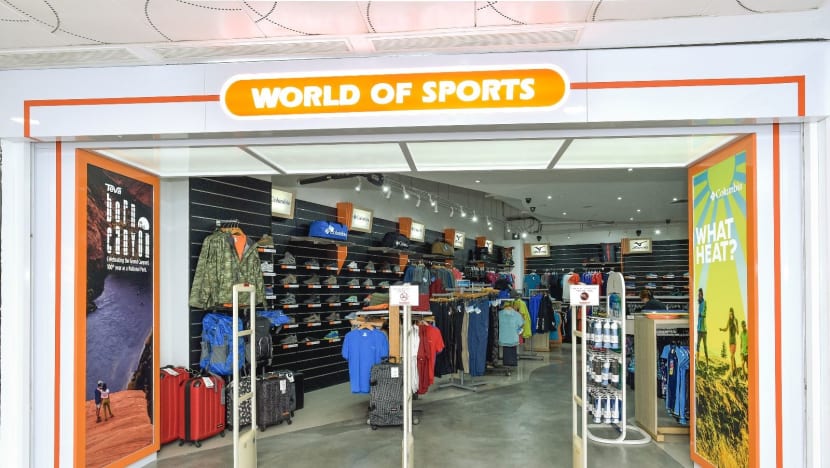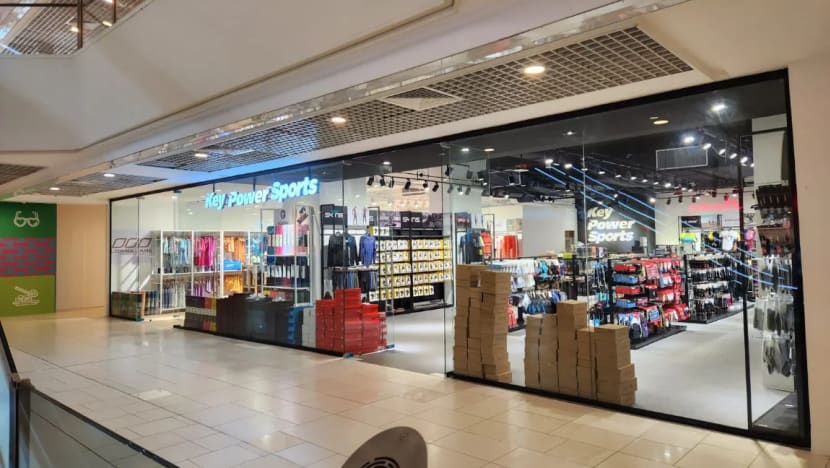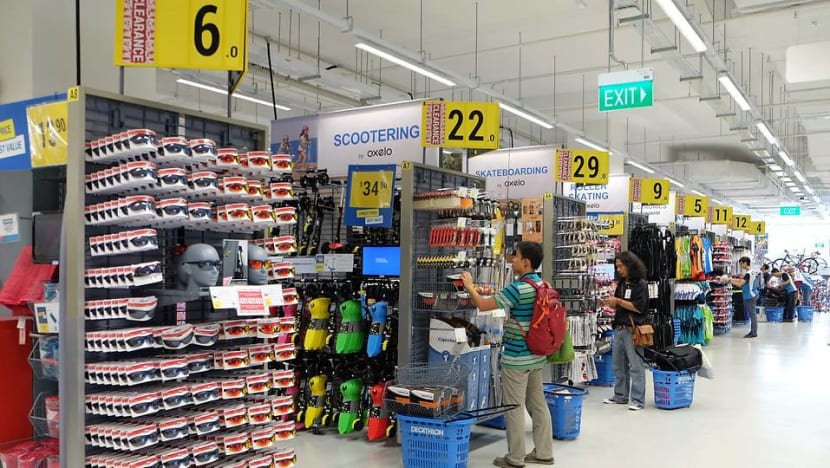Royal Sporting House and World Of Sports used to dominate Singapore's sports retail scene - what happened?
SINGAPORE: In 2017, Royal Sporting House had 28 stores across Singapore, and was embarking on an image revamp to appeal to younger audiences.
Today, just six outlets remain, according to information published online by the local sports retailer. This year alone, at least two stores - at Causeway Point and Northpoint City - have closed down.
Royal Sporting House opened its first store in Lucky Plaza in 1977, and steadily became one of the most recognisable, go-to destinations for generations of Singaporeans looking to buy sports equipment.
One such customer was avid runner and swimmer Maximilian Sin, who about 10 years ago was visiting the outlets on a weekly basis to look out for attractive sales.
“The sales seemed more frequent at Royal Sporting House; the environment felt less intimidating, more mass-market, and more ‘heartland’,” said the 28-year-old, who works as a copywriter.
“I guess digital marketing and online (e-commerce) apps weren’t quite as rampant yet, and you didn’t quite know when great sales were happening."
Customers CNA spoke to said the decline in Royal Sporting House's appeal could be traced to the late 2010s.
For Mr Sin, it was when he started looking for serious running products, which he felt Royal Sporting House could not provide. So he turned instead to more niche local retailers like Running Lab, along with flagship stores of international brands such as New Balance and Nike.
Other customers felt Royal Sporting House simply could not compete with lower prices by other retailers.
Mr Wyn Kheng, 31, pointed to French firm Decathlon offering a larger variety of products under one roof, and at cheaper prices.
“People don’t really care about brands when they’re trying out a new sport," he said. "If I go to (a local retailer) it would be a proper brand, and cost a bomb."
CNA reached out multiple times to Royal Sporting House, which was acquired by UAE-based Gulf Marketing Group in 2020, but received no reply.
It is not the only local sports retailer that has undergone a mass closure of stores in recent years.
World Of Sports, which once had more than 20 outlets, appears to have quietly exited the retail scene. Its last social media post was in September 2022, and its website is defunct.
Malls such as Plaza Singapura, VeloCity in Novena and Jurong Point have listed its stores as permanently closed on their online directories. No listing for an open and operating store can be found on Google Maps.
It was reported in 2016 that World Of Sports was owned by VGO Corp, a listed homegrown firm founded by businessman George Goh. CNA reached out to VGO but received no response either.
Then there was Sportslink, which liquidated in July 2020 after accumulating debts to a substantial number of creditors. The local firm started from a single store at Queensway Shopping Centre in the 1980s, and had 35 outlets by 2015.

OVERHEADS AND ONLINE PATTERNS
Asked about the decline of these homegrown sports brands, Professor Lawrence Loh from the National University of Singapore (NUS) pointed to the COVID-19 pandemic as "the straw that broke the camel's back", catalysing an exodus from physical shops to online purchasing.
“This buying habit kicked in - once consumers got used to the idea, it just stayed on even after the pandemic,” said the director of the Centre for Governance and Sustainability at NUS' Business School.
Mr Robert Lu, founder and managing director of local retailer Key Power Sports said the industry was already struggling to adapt to up-and-coming brands as well as e-commerce. The pandemic then pushed some retailers over the edge.
Key Power Sports, which first opened in 2006, managed to keep revenue constant during the pandemic, by pivoting to the internet. Online sales made up 15 per cent of its total revenue before the COVID crisis; this figure currently stands at about 35 per cent.
Overall retail figures are also on the decline.
Latest data from the Department of Statistics Singapore show that sales - which include both physical and online transactions - fell by 3.6 per cent year-on-year for February. Year-on-year sales for apparel and footwear fell by 18.4 per cent, while sales for recreational goods dropped 8.1 per cent.
Mr Lu said rising rentals was another challenge.
“Overheads are one of the main reasons why some (local sports retailers) are shutting down, because of high operation costs, (they) cannot sustain for long term,” he said.
Mr Lu was still optimistic, saying he plans to open two more outlets to add to the current four - one by this year and another in 2027.

KEY TO INNOVATE, GO NICHE
Mr Leon Lai, the owner of advertising agency GOVT which has worked with sports brands such as PUMA, said some local retailers simply did not innovate quickly enough when the tides turned during the pandemic.
Many are still wedded to "mom-and-pop" ways of selling, he said.
“In the past, when (e-commerce) wasn’t so accessible, it worked, but as the market becomes more sophisticated, if we don’t adapt towards it, then consumers will choose to spend their dollars somewhere else.”
Some did attempt to sell their products online, only for their websites to be lacking in user experience. The more successful ones used models and invested in copywriters among other moves, said Mr Lai.
They also boosted their online and social media presence by hiring influencers and popular sports personalities to promote their products.
Even away from the online sphere and in the traditional physical space, local retailers have become increasingly challenged by international brands like Decathlon.
Beyond offering low prices and a wide variety, some Decathlon outlets also have facilities like cycling tracks to try out bicycles. "The human experience is top class,” said Mr Lai.

For local stores to keep up, they likely cannot compete on scale but have to focus on a niche target audience.
Mr Lai said that with the rise in sports participation in Singapore, and many looking to be more serious about their hobbies, there is a new appetite for specialised brands and products that a one-size-fits-all, mass-market store would not carry.
Agreeing, Mr Sin, the consumer, highlighted the importance of retailers having more "personalised” offerings like better-trained staff to answer queries about products.
Mr Lu, founder of Key Power Sports, said larger brands like Decathlon were not his direct competitors.
Instead, he's looking to customers who may have picked up a sport by purchasing beginner products from Decathlon, and now want to "upgrade" to better brands.
For example, post-pandemic, there was a surge in the popularity of yoga and pilates, so Key Power brought in high-quality mats costing over S$200 (US$148), for those serious about the activity.
Ultimately, it is survival of the fittest in the cut-throat world of retail, said Mr Lai.
“Rent is expensive, wages are expensive … But if you can't fight this, what you can fight with is your speed to market. (And be) forward-thinking."
Disclaimer: Investing carries risk. This is not financial advice. The above content should not be regarded as an offer, recommendation, or solicitation on acquiring or disposing of any financial products, any associated discussions, comments, or posts by author or other users should not be considered as such either. It is solely for general information purpose only, which does not consider your own investment objectives, financial situations or needs. TTM assumes no responsibility or warranty for the accuracy and completeness of the information, investors should do their own research and may seek professional advice before investing.
Most Discussed
- 1
- 2
- 3
- 4
- 5
- 6
- 7
- 8
- 9
- 10